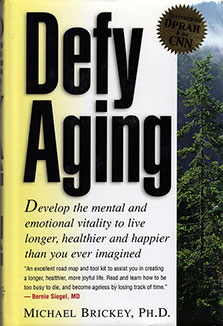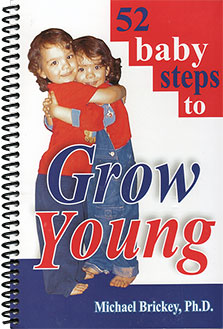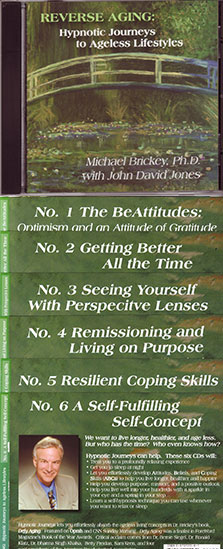The Defy Aging Newsletter
Anti-aging psychology, holistic health, and wellness
These are archives of a biweekly e-mail newsletter for helping you think, feel, look, and be more youthful and live with purpose.
Number 147
This issue:
Anti-Aging Research--Part 2
ACTION TO TAKE
The anti-aging cavalry is on the way. Take care of yourself now so you can benefit from coming scientific advances.
WHY
Last issue addressed how a family of enzymes called sirtuins hold promise for slowing aging and helping remediate diseases such as diabetes and Alzheimer's. Today I would like to discuss another research endeavor that holds promise of improving health and slowing aging.
Human Growth Hormone prompts our bodies to grow new tissue. HGH levels decline after puberty and continue to decline with age. Physicians began using Human Growth Hormones (HGH) in the 1980's to help very short children grow to a more normal height. That use is still common.
In 1990, Dr. Daniel Rudman gave HGH injections to elderly nursing home residents and got dramatic results–the residents developed bigger muscles, thicker skin, denser bones, more energy, lower blood pressure, fewer wrinkles, better vision, thicker hair, improved mood and memory and improved sexual functioning. Since then, thousands of athletes, actors, and celebrities have been taking HGH injections at about $10,000 a year. My take is that if you are already elderly or have certain unique health issues, it might be worth trying. At younger ages, however, it is risky because not enough is known about the effects of long-term use.
Wouldn't it be nice if we could get our bodies to naturally produce more HGH? You can. Exercising, especially strength exercising, helps increase your HGH levels. On the Internet you can find hundreds of sites selling secretagogues–over-the-counter supplements that are supposed to prompt your body to increase HGH production. Do any work? There is no good way to tell. I would expect results in a third of users just from the placebo effects. That alone can account for the testimonials. Needless to say it is a buyer beware market. (I, for one, have not purchased any.)Researchers at the University of Washington and the VA have been testing capromorelin, an experimental drug from Pfizer. 395 men and women ages 65-84 used the drug for six months. They gained an average of three pounds in lean muscle mass and were better able to walk a straight line (a test of coordination, balance and strength). A year later they showed improvement in stair climbing. Merck reportedly is working on a similar drug.
While the pharmaceutical companies have often had questionable practices in reporting research and promoting medications, I certainly have more faith in their products than a secretagogue found on the Internet. The FDA does not regard aging as a disease and sets higher approval standards for medications that just improve functioning as opposed to cure or manage diseases. Thus medications such as capromorelin will receive extra scrutiny for the FDA.
QUOTES
Basic research is what I am doing when I don't know what I'm doing.
~Rocket scientist, Wernher von Braun
RESEARCH HUMOR
Finagle's First Law: If an experiment works, something has gone wrong.
Finagle's Second Law: No matter what the anticipated result, there will always be someone eager to (a) misinterpret it, (b) fake it, or (c) believe it happened according to his own pet theory.
Finagle's Third Law: In any collection of data, the figure most obviously correct, beyond all need of checking, is the mistake.
Finagle's Fourth Law: Once a job is fouled up, anything done to improve it only makes it worse.
Finagle's Creed: Science is true. Don't be misled by facts.
Corollaries on mistakes:
- Nobody whom you ask for help will see it.
- The first person who stops by, whose advice you really don't want to hear, will see it immediately.
Reprint this article from:
THE DEFY AGING NEWSLETTER
Anti-Aging Psychology
Holistic Health and Wellness
This newsletter article may be reprinted in E-zines, newsletters, newspapers, and magazines provided the content is not edited and the attribution below is given. Formatting may be changed and you may use one of the web site pictures of the author to accompany the article.
"Dr. Michael Brickey, The Anti-Aging Psychologist, teaches people to think, feel, look and be more youthful. He is an inspiring keynote speaker and Oprah-featured author. His works include: Defy Aging, 52 baby steps to Grow Young, and Reverse Aging (anti-aging hypnosis CDs). Visit www.NotAging.com for a free report on anti-aging secrets and a free newsletter with practical anti-aging tips."






